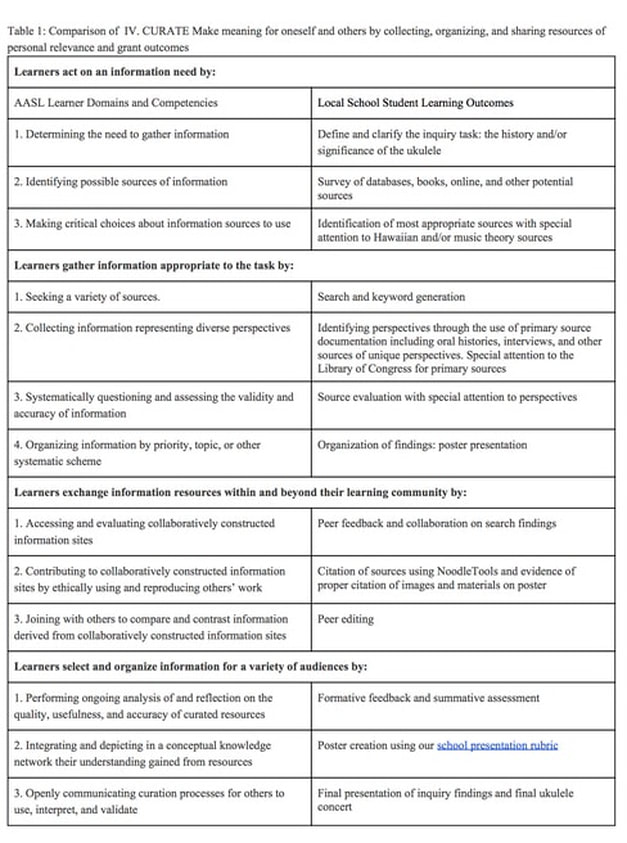One of the students opened one of his bags and pulled out a ukulele. He explained that it belonged to his sister and they had stayed up late the night before while she taught him some basic chords. He strummed something that was unrecognizable but that didn’t matter because the music was like a magic spell. They all lit up and asked for turns on the ukulele. By the end of the class, this battered band of stressed out teens were singing songs, laughing, and joyous. At that moment I knew I would be writing a grant.
When I was in graduate school one of my professors said that as school library professionals we should always be doing one of two things: writing a grant or implementing a grant. It was wise advice because when you are asking for money it is a great opportunity to showcase your program and vision. In my school community we have a Parent’s Association grant for requests under $300, and the bigger Educational Fund for larger requests. The ukulele grant was for $600 for 10 ukuleles. Central to the grant application was that the proposal be specifically tied to our School Improvement Plan.
The School Improvement Plan
Like so many communities, ours has been working to address record levels of student stress and anxiety. We adopted a program called Challenge Success to partner with families in lowering the high stakes environment of college acceptance and refocusing on a healthier mindset. The Challenge Success mission statement effectively outlines the goals of the program:
At Challenge Success, we believe that our society has become too focused on grades, test scores, and performance, leaving little time for kids to develop the necessary skills to become resilient, ethical, and motivated learners. We partner with schools, families, and communities to embrace a broad definition of success and to implement research-based strategies that promote student well-being and engagement with learning. After all, success is measured over the course of a lifetime, not at the end of a semester. (Stanford Graduate School of Education, 2019).
Goal II: Cultivate positive connections among all community members in order to promote a mindful culture of wellness, responsibility, and good citizenship.
Offer opportunities for students and staff learn and practice mindfulness and inspiring a mindfulness culture.
Goal III: Foster a culture of academic engagement, curiosity, honesty, and inquiry.
Increase students’ well-being and reduce student stress through work in three focal areas: homework, engagement, extracurricular activities.
The AASL Standards: Curation
Thankfully, school libraries have been at the forefront of creative collection curation. In addition to alternative reading materials, collections have expanded to include puzzles, games, maker spaces, and all manner of materials selected to support the students and goals of the school community. Why not ukuleles?
My current AP Seminar students will be the first to use the ukuleles. I have a school counselor who is a part time musician and has already volunteered to give the group lessons. But it won’t just be about strumming. We will use the ukulele as a jumping off point for learning about the requirements of AP Capstone Research which is a year-long inquiry into a research question of the student’s own design. For the ukulele activity, students will collaboratively develop an overview of the history of the ukulele (literature review), individually design a specific research question related to some aspect of the ukulele of their choice (historic, political, cultural, music theory, etc.), identify a methodology for their inquiry (historic review, music theory, case study, etc.) , and answer their research question. They won’t actually write the paper, but will become familiar with the process in advance of next year. The final assessment will be a poster presentation and a ukulele concert.
In the AASL Standards this grant fits very nicely in Shared Foundation IV: Curate (National School, 2018, p. 94-95).

The grant has already increased student engagement as demonstrated by their enthusiasm and excitement, will definitely promote mindfulness, and reinforce the concept of lifelong learning described in Challenge Success. I bought a personal ukulele for myself and am looking forward to learning alongside my students. This grant has improved my engagement and mindfulness, too!
Concord Carlisle Regional School District (Ed.). (2018). Concord Carlisle School Improvement Plan. Retrieved April 16, 2019, from Concord Carlisle Regional High School website: https://drive.google.com/file/d/0ByPCL9wVMt_GWDZubGk1bWdQLVE/preview
DDC - 700 - The arts (Ed.). (n.d.). DDC - 700 - The arts. Retrieved April 16, 2019, from Dewey Decimal Classification website: http://bpeck.com/references/DDC/ddc_mine700.htm
National school library standards: For Learners, School Librarians, and School Libraries. (2018). ALA: Chicago.
Stanford Graduate School of Education (Ed.). (2019). Challenge Success. Retrieved April 16, 2019, from Challenge Success website: http://www.challengesuccess.org/

